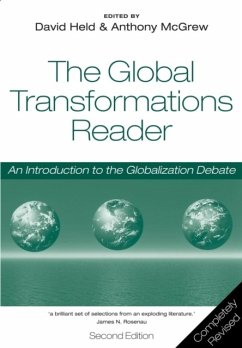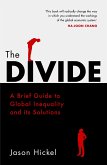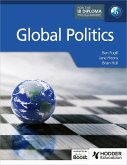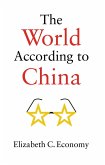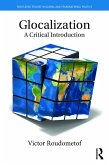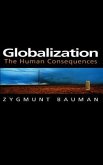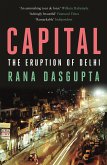42,99 €
inkl. MwSt.
Versandkostenfrei*
Liefertermin unbestimmt
Melden Sie sich
hier
hier
für den Produktalarm an, um über die Verfügbarkeit des Produkts informiert zu werden.

21 °P sammeln
- Broschiertes Buch
This revised and fully updated edition brings together the most original contributions from both sides of the globalization debate.
Extensive new material incorporates the latest developments and sets the issues in the context of a global order in constant flux.
Andere Kunden interessierten sich auch für
![The Divide The Divide]() Jason HickelThe Divide11,99 €
Jason HickelThe Divide11,99 €![Global Politics for the IB Diploma Global Politics for the IB Diploma]() Ben FugillGlobal Politics for the IB Diploma51,99 €
Ben FugillGlobal Politics for the IB Diploma51,99 €![The World According to China The World According to China]() Elizabeth C. Economy (Stanford University)The World According to China19,99 €
Elizabeth C. Economy (Stanford University)The World According to China19,99 €![Glocalization Glocalization]() Victor RoudometofGlocalization38,99 €
Victor RoudometofGlocalization38,99 €![Globalization Globalization]() Zygmunt Bauman (Universities of Leeds and Warsaw)Globalization22,99 €
Zygmunt Bauman (Universities of Leeds and Warsaw)Globalization22,99 €![Empire Empire]() Michael HardtEmpire38,99 €
Michael HardtEmpire38,99 €![Capital Capital]() Rana DasguptaCapital16,99 €
Rana DasguptaCapital16,99 €-
-
-
This revised and fully updated edition brings together the most original contributions from both sides of the globalization debate.
Extensive new material incorporates the latest developments and sets the issues in the context of a global order in constant flux.
Hinweis: Dieser Artikel kann nur an eine deutsche Lieferadresse ausgeliefert werden.
Extensive new material incorporates the latest developments and sets the issues in the context of a global order in constant flux.
Hinweis: Dieser Artikel kann nur an eine deutsche Lieferadresse ausgeliefert werden.
Produktdetails
- Produktdetails
- Verlag: Blackwell Publishers / Polity Press
- 2nd Edition
- Seitenzahl: 624
- Erscheinungstermin: 1. August 2003
- Englisch
- Abmessung: 249mm x 172mm x 34mm
- Gewicht: 1075g
- ISBN-13: 9780745631356
- ISBN-10: 0745631355
- Artikelnr.: 12176191
- Herstellerkennzeichnung
- Libri GmbH
- Europaallee 1
- 36244 Bad Hersfeld
- 06621 890
- Verlag: Blackwell Publishers / Polity Press
- 2nd Edition
- Seitenzahl: 624
- Erscheinungstermin: 1. August 2003
- Englisch
- Abmessung: 249mm x 172mm x 34mm
- Gewicht: 1075g
- ISBN-13: 9780745631356
- ISBN-10: 0745631355
- Artikelnr.: 12176191
- Herstellerkennzeichnung
- Libri GmbH
- Europaallee 1
- 36244 Bad Hersfeld
- 06621 890
David Held is Graham Wallas Professor of Political Science at the London School of Economics and Political Science Anthony McGrew is Professor of International Relations at Southampton University
Preface to the Second Edition.
Preface to the First Edition.
Sources and Acknowledgements.
Acronyms.
The Great Globalization Debate: An Introduction David Held and Anthony
McGrew.
Part I Understanding Globalization.
Introduction.
Chapter 1: Globalization, George Modelski, Professor of Political Science
at the University of Washington.
Chapter 2: The Globalizing of Modernity, Anthony Giddens, Director of the
London School of Economics and Political Science. He was formerly Professor
of Sociology at the University of Cambridge and Fellow of King's College,
Cambridge.
Chapter 3: Rethinking Globalization, David Held, Graham Wallas Professor of
Political Science at the London School of Economics and Political Science
and Anthony McGrew, Professor of International Relations at Southampton
University.
Chapter 4: Globalization: What's New? What's Not? (And So What?), Robert O.
Keohane, James B. Duke Professor of Political Science at Duke University
and Joseph Nye, Dean of the John F. Kennedy School of Government at Harvard
University.
Chapter 5: What is Global about Globalization? Jan Aarte Scholte, Reader in
International Studies at the University of Warwick.
Chapter 6: The Problem of Globalization Theory, Justin Rosenberg.
Chapter 7: Globalization - A Necessary Myth, Paul Hirst, Professor of
Social Theory at Birkbeck College, University of London and Grahame
Thompsor, Professor of Political Economy at the Open University.
Chapter 8: Clash of Globalizations, Stanley Hoffman, Battenwieser
University Professor at Harvard University.
Chapter 9: Globalization and American Power, Joseph S. Nye, Dean of the
John F. Kennedy School of Government at Harvard University.
Chapter 10 Globalization as Empire, Michael Hardt, Associate Professor of
Literature and Romance Studies at Duke University and Antonio Negri, author
of "Empire" with Michael Hardt.
Part II Political Power and Civil Society: A Reconfiguration?.
Introduction.
Chapter 11: The Declining Authority of States, Susan Strange, formerly a
Visiting Professor at the University of Warwick.
Chapter 12: Has Globalization Ended the Rise and Rise of the Nation-State?
Michael Mann, Professor of Sociology at UCLA.
Chapter 13: Sovereignty in International Society, Robert Keohane, James B.
Duke Professor of Political Science at Duke University.
Chapter 14: The Changing Structure of International Law: Sovereignty
Transformed? David Held, Graham Wallas Professor of Political Science at
the London School of Economics and Political Science.
Chapter 15: The Security State, Ian Clark, Professor of International
Politics at the University of Wales.
Chapter 16: Governing the Global Economy Through Government Networks,
Anne-Marie Slaughter dean of the Woodrow Wilson School of Public and
International Affairs at Princeton University.
Chapter 17: Power Shift, Jessica T. Matthews, Senior Fellow at the Council
on Foreign Relations.
Chapter 18: Globalization and Modes of Regionalist Governance, Anthony
Payne, Professor of Politics at the University of Sheffield.
Chapter 19: Governance in a New Global Order, James N. Rosenau, University
Professor of International Affairs at the George Washington University.
Part III The Fate of National Culture in an Age of Global Communication.
Introduction.
Chapter 20: Encountering Globalization, Kevin Robins, Professor of
Communications at Goldsmiths College.
Chapter 21: The Globalization of Communication, John B. Thompson Professor
of Sociology at the University of Cambridge.
Chapter 22: The New Global Media, Robert McChesney, Professor at the
Institute of Communications Research, University of Illinois.
Chapter 23: Globalization and Cultural Identity, John Tomlinson, Director
of the Centre for Research in International Communication and Culture,
Nottingham Trent University.
Chapter 24: Towards a Global Culture? Anthony D. Smith, Professor of
Ethnicity and Nationalism at the European Institute, London School of
Economics and Political Science.
Chapter 25: Global Governance and Cosmopolitan Citizens, Pippa Norris,
Professor at the J. F. Kennedy School of Government, Harvard University.
Part IV A Global Economy?.
Introduction.
Chapter 26: A New Geo-economy, Peter Dicken, Professor of Geography at the
University of Manchester.
Chapter 27: Global Informational Capitalism, Manuel Castells, Professor of
Sociology and Urban Planning at the University of California at Berkeley.
Chapter 28: The Limits to Economic Globalization, Paul Hirst, Professor of
Social Theory at Birkbeck College, University of London and Grahame
Thompsor, Professor of Political Economy at the Open University.
Chapter 29: The Nation-State in the Global Economy, Robert Gilpin,
Professor of Politics and International Affairs at Princeton University.
Chapter 30: Global Market versus the New Regionalism, Björn Hettne,
Professor at the Department of Peace and Development Research, Göteborg
University.
Chapter 31: Globalization and the Political Economy of Capitalist
Democracies, Fritz Scharpf Professor at the Max Planck Institute,
University of Koln.
Chapter 32: Has Globalization Gone Too Far? Dani Rodrik , Rafiq Hariri
Professor of International Political Economy at Harvard University.
Chapter 33: Global Markets and National Politics, Geoffrey Garrett,
Professor of Political Science at Yale University.
Chapter 34: The Effect of Globalization on Taxation, Institutions and
Control of the Macroeconomy, Duane Swank, Associate Professor of Political
Science at Marquette University.
Part V Divided World, Divided Nations.
Introduction.
Chapter 35: Patterns of Global Inequality, United Nations Development
Programme.
Chapter 36: The Rise of the Fourth World, Manuel Castells, Professor of
Sociology and Urban Planning at the University of California at Berkeley.
Chapter 37: Are Global Poverty and Inequality Getting Worse? Robert Wade,
Professor of Political Economy at the London School of Economics and
Political Science and Martin Wolf, chief economics commentator of the
Financial Times.
Chapter 38: Spreading the Wealth, David Dollar and Aart Kraay , economists
at the World Bank's Development Research Group.
Chapter 39: Globalization and Gendered Inequality, Jill Steans, Lecturer in
International Relations Theory at the University of Birmingham.
Chapter 40: Order, Globalization and Inequality in World Politics, Ngaire
Woods, Fellow in Politics and International Relations at University
College, Oxford.
Chapter 41: The Promise of Global Institutions, Joseph Stiglitz, Professor
of Economics and Finance at the University of Columbia.
Part VI World Orders, Normative Choices.
Introduction.
Chapter 42: Global Governance: Prospects and Problems, Fred Halliday,
Professor of International Relations at the London School of Economics and
Political Science.
Chapter 43: Models of Transnational Democracy, Anthony McGrew, Professor of
International Relations at Southampton University.
Chapter 44: Cosmopolitanism: Taming Globalization, David Held, Graham
Wallas Professor of Political Science at the London School of Economics and
Political Science.
Chapter 45: Can International Organizations be Democractic? A Sceptic's
View, Robert Dahl, Sterling Professor Emeritus of Political Science at Yale
University.
Chapter 46: The Postnational Constellation, Jürgen Habermas, Professor of
Philosophy Emeritus at the University of Frankfurt.
Chapter 47: Priorities of Global Justice, Thomas W. Pogge, Associate
Professor in the Department of Philosophy at Columbia University.
Chapter 48: Global Civil Society, Mary Kaldor , Director of the Global
Civil Society Programme at the London School of Economics and Political
Science.
Chapter 49: A World Gone Wrong? Chris Brown, Professor of International
Relations at the London School of Economics and Political Science.
Chapter 50: Beyond the States System? Hedley Bull, formerly Montague Burton
Professor of International Relations, University of Oxford
Preface to the First Edition.
Sources and Acknowledgements.
Acronyms.
The Great Globalization Debate: An Introduction David Held and Anthony
McGrew.
Part I Understanding Globalization.
Introduction.
Chapter 1: Globalization, George Modelski, Professor of Political Science
at the University of Washington.
Chapter 2: The Globalizing of Modernity, Anthony Giddens, Director of the
London School of Economics and Political Science. He was formerly Professor
of Sociology at the University of Cambridge and Fellow of King's College,
Cambridge.
Chapter 3: Rethinking Globalization, David Held, Graham Wallas Professor of
Political Science at the London School of Economics and Political Science
and Anthony McGrew, Professor of International Relations at Southampton
University.
Chapter 4: Globalization: What's New? What's Not? (And So What?), Robert O.
Keohane, James B. Duke Professor of Political Science at Duke University
and Joseph Nye, Dean of the John F. Kennedy School of Government at Harvard
University.
Chapter 5: What is Global about Globalization? Jan Aarte Scholte, Reader in
International Studies at the University of Warwick.
Chapter 6: The Problem of Globalization Theory, Justin Rosenberg.
Chapter 7: Globalization - A Necessary Myth, Paul Hirst, Professor of
Social Theory at Birkbeck College, University of London and Grahame
Thompsor, Professor of Political Economy at the Open University.
Chapter 8: Clash of Globalizations, Stanley Hoffman, Battenwieser
University Professor at Harvard University.
Chapter 9: Globalization and American Power, Joseph S. Nye, Dean of the
John F. Kennedy School of Government at Harvard University.
Chapter 10 Globalization as Empire, Michael Hardt, Associate Professor of
Literature and Romance Studies at Duke University and Antonio Negri, author
of "Empire" with Michael Hardt.
Part II Political Power and Civil Society: A Reconfiguration?.
Introduction.
Chapter 11: The Declining Authority of States, Susan Strange, formerly a
Visiting Professor at the University of Warwick.
Chapter 12: Has Globalization Ended the Rise and Rise of the Nation-State?
Michael Mann, Professor of Sociology at UCLA.
Chapter 13: Sovereignty in International Society, Robert Keohane, James B.
Duke Professor of Political Science at Duke University.
Chapter 14: The Changing Structure of International Law: Sovereignty
Transformed? David Held, Graham Wallas Professor of Political Science at
the London School of Economics and Political Science.
Chapter 15: The Security State, Ian Clark, Professor of International
Politics at the University of Wales.
Chapter 16: Governing the Global Economy Through Government Networks,
Anne-Marie Slaughter dean of the Woodrow Wilson School of Public and
International Affairs at Princeton University.
Chapter 17: Power Shift, Jessica T. Matthews, Senior Fellow at the Council
on Foreign Relations.
Chapter 18: Globalization and Modes of Regionalist Governance, Anthony
Payne, Professor of Politics at the University of Sheffield.
Chapter 19: Governance in a New Global Order, James N. Rosenau, University
Professor of International Affairs at the George Washington University.
Part III The Fate of National Culture in an Age of Global Communication.
Introduction.
Chapter 20: Encountering Globalization, Kevin Robins, Professor of
Communications at Goldsmiths College.
Chapter 21: The Globalization of Communication, John B. Thompson Professor
of Sociology at the University of Cambridge.
Chapter 22: The New Global Media, Robert McChesney, Professor at the
Institute of Communications Research, University of Illinois.
Chapter 23: Globalization and Cultural Identity, John Tomlinson, Director
of the Centre for Research in International Communication and Culture,
Nottingham Trent University.
Chapter 24: Towards a Global Culture? Anthony D. Smith, Professor of
Ethnicity and Nationalism at the European Institute, London School of
Economics and Political Science.
Chapter 25: Global Governance and Cosmopolitan Citizens, Pippa Norris,
Professor at the J. F. Kennedy School of Government, Harvard University.
Part IV A Global Economy?.
Introduction.
Chapter 26: A New Geo-economy, Peter Dicken, Professor of Geography at the
University of Manchester.
Chapter 27: Global Informational Capitalism, Manuel Castells, Professor of
Sociology and Urban Planning at the University of California at Berkeley.
Chapter 28: The Limits to Economic Globalization, Paul Hirst, Professor of
Social Theory at Birkbeck College, University of London and Grahame
Thompsor, Professor of Political Economy at the Open University.
Chapter 29: The Nation-State in the Global Economy, Robert Gilpin,
Professor of Politics and International Affairs at Princeton University.
Chapter 30: Global Market versus the New Regionalism, Björn Hettne,
Professor at the Department of Peace and Development Research, Göteborg
University.
Chapter 31: Globalization and the Political Economy of Capitalist
Democracies, Fritz Scharpf Professor at the Max Planck Institute,
University of Koln.
Chapter 32: Has Globalization Gone Too Far? Dani Rodrik , Rafiq Hariri
Professor of International Political Economy at Harvard University.
Chapter 33: Global Markets and National Politics, Geoffrey Garrett,
Professor of Political Science at Yale University.
Chapter 34: The Effect of Globalization on Taxation, Institutions and
Control of the Macroeconomy, Duane Swank, Associate Professor of Political
Science at Marquette University.
Part V Divided World, Divided Nations.
Introduction.
Chapter 35: Patterns of Global Inequality, United Nations Development
Programme.
Chapter 36: The Rise of the Fourth World, Manuel Castells, Professor of
Sociology and Urban Planning at the University of California at Berkeley.
Chapter 37: Are Global Poverty and Inequality Getting Worse? Robert Wade,
Professor of Political Economy at the London School of Economics and
Political Science and Martin Wolf, chief economics commentator of the
Financial Times.
Chapter 38: Spreading the Wealth, David Dollar and Aart Kraay , economists
at the World Bank's Development Research Group.
Chapter 39: Globalization and Gendered Inequality, Jill Steans, Lecturer in
International Relations Theory at the University of Birmingham.
Chapter 40: Order, Globalization and Inequality in World Politics, Ngaire
Woods, Fellow in Politics and International Relations at University
College, Oxford.
Chapter 41: The Promise of Global Institutions, Joseph Stiglitz, Professor
of Economics and Finance at the University of Columbia.
Part VI World Orders, Normative Choices.
Introduction.
Chapter 42: Global Governance: Prospects and Problems, Fred Halliday,
Professor of International Relations at the London School of Economics and
Political Science.
Chapter 43: Models of Transnational Democracy, Anthony McGrew, Professor of
International Relations at Southampton University.
Chapter 44: Cosmopolitanism: Taming Globalization, David Held, Graham
Wallas Professor of Political Science at the London School of Economics and
Political Science.
Chapter 45: Can International Organizations be Democractic? A Sceptic's
View, Robert Dahl, Sterling Professor Emeritus of Political Science at Yale
University.
Chapter 46: The Postnational Constellation, Jürgen Habermas, Professor of
Philosophy Emeritus at the University of Frankfurt.
Chapter 47: Priorities of Global Justice, Thomas W. Pogge, Associate
Professor in the Department of Philosophy at Columbia University.
Chapter 48: Global Civil Society, Mary Kaldor , Director of the Global
Civil Society Programme at the London School of Economics and Political
Science.
Chapter 49: A World Gone Wrong? Chris Brown, Professor of International
Relations at the London School of Economics and Political Science.
Chapter 50: Beyond the States System? Hedley Bull, formerly Montague Burton
Professor of International Relations, University of Oxford
Preface to the Second Edition.
Preface to the First Edition.
Sources and Acknowledgements.
Acronyms.
The Great Globalization Debate: An Introduction David Held and Anthony
McGrew.
Part I Understanding Globalization.
Introduction.
Chapter 1: Globalization, George Modelski, Professor of Political Science
at the University of Washington.
Chapter 2: The Globalizing of Modernity, Anthony Giddens, Director of the
London School of Economics and Political Science. He was formerly Professor
of Sociology at the University of Cambridge and Fellow of King's College,
Cambridge.
Chapter 3: Rethinking Globalization, David Held, Graham Wallas Professor of
Political Science at the London School of Economics and Political Science
and Anthony McGrew, Professor of International Relations at Southampton
University.
Chapter 4: Globalization: What's New? What's Not? (And So What?), Robert O.
Keohane, James B. Duke Professor of Political Science at Duke University
and Joseph Nye, Dean of the John F. Kennedy School of Government at Harvard
University.
Chapter 5: What is Global about Globalization? Jan Aarte Scholte, Reader in
International Studies at the University of Warwick.
Chapter 6: The Problem of Globalization Theory, Justin Rosenberg.
Chapter 7: Globalization - A Necessary Myth, Paul Hirst, Professor of
Social Theory at Birkbeck College, University of London and Grahame
Thompsor, Professor of Political Economy at the Open University.
Chapter 8: Clash of Globalizations, Stanley Hoffman, Battenwieser
University Professor at Harvard University.
Chapter 9: Globalization and American Power, Joseph S. Nye, Dean of the
John F. Kennedy School of Government at Harvard University.
Chapter 10 Globalization as Empire, Michael Hardt, Associate Professor of
Literature and Romance Studies at Duke University and Antonio Negri, author
of "Empire" with Michael Hardt.
Part II Political Power and Civil Society: A Reconfiguration?.
Introduction.
Chapter 11: The Declining Authority of States, Susan Strange, formerly a
Visiting Professor at the University of Warwick.
Chapter 12: Has Globalization Ended the Rise and Rise of the Nation-State?
Michael Mann, Professor of Sociology at UCLA.
Chapter 13: Sovereignty in International Society, Robert Keohane, James B.
Duke Professor of Political Science at Duke University.
Chapter 14: The Changing Structure of International Law: Sovereignty
Transformed? David Held, Graham Wallas Professor of Political Science at
the London School of Economics and Political Science.
Chapter 15: The Security State, Ian Clark, Professor of International
Politics at the University of Wales.
Chapter 16: Governing the Global Economy Through Government Networks,
Anne-Marie Slaughter dean of the Woodrow Wilson School of Public and
International Affairs at Princeton University.
Chapter 17: Power Shift, Jessica T. Matthews, Senior Fellow at the Council
on Foreign Relations.
Chapter 18: Globalization and Modes of Regionalist Governance, Anthony
Payne, Professor of Politics at the University of Sheffield.
Chapter 19: Governance in a New Global Order, James N. Rosenau, University
Professor of International Affairs at the George Washington University.
Part III The Fate of National Culture in an Age of Global Communication.
Introduction.
Chapter 20: Encountering Globalization, Kevin Robins, Professor of
Communications at Goldsmiths College.
Chapter 21: The Globalization of Communication, John B. Thompson Professor
of Sociology at the University of Cambridge.
Chapter 22: The New Global Media, Robert McChesney, Professor at the
Institute of Communications Research, University of Illinois.
Chapter 23: Globalization and Cultural Identity, John Tomlinson, Director
of the Centre for Research in International Communication and Culture,
Nottingham Trent University.
Chapter 24: Towards a Global Culture? Anthony D. Smith, Professor of
Ethnicity and Nationalism at the European Institute, London School of
Economics and Political Science.
Chapter 25: Global Governance and Cosmopolitan Citizens, Pippa Norris,
Professor at the J. F. Kennedy School of Government, Harvard University.
Part IV A Global Economy?.
Introduction.
Chapter 26: A New Geo-economy, Peter Dicken, Professor of Geography at the
University of Manchester.
Chapter 27: Global Informational Capitalism, Manuel Castells, Professor of
Sociology and Urban Planning at the University of California at Berkeley.
Chapter 28: The Limits to Economic Globalization, Paul Hirst, Professor of
Social Theory at Birkbeck College, University of London and Grahame
Thompsor, Professor of Political Economy at the Open University.
Chapter 29: The Nation-State in the Global Economy, Robert Gilpin,
Professor of Politics and International Affairs at Princeton University.
Chapter 30: Global Market versus the New Regionalism, Björn Hettne,
Professor at the Department of Peace and Development Research, Göteborg
University.
Chapter 31: Globalization and the Political Economy of Capitalist
Democracies, Fritz Scharpf Professor at the Max Planck Institute,
University of Koln.
Chapter 32: Has Globalization Gone Too Far? Dani Rodrik , Rafiq Hariri
Professor of International Political Economy at Harvard University.
Chapter 33: Global Markets and National Politics, Geoffrey Garrett,
Professor of Political Science at Yale University.
Chapter 34: The Effect of Globalization on Taxation, Institutions and
Control of the Macroeconomy, Duane Swank, Associate Professor of Political
Science at Marquette University.
Part V Divided World, Divided Nations.
Introduction.
Chapter 35: Patterns of Global Inequality, United Nations Development
Programme.
Chapter 36: The Rise of the Fourth World, Manuel Castells, Professor of
Sociology and Urban Planning at the University of California at Berkeley.
Chapter 37: Are Global Poverty and Inequality Getting Worse? Robert Wade,
Professor of Political Economy at the London School of Economics and
Political Science and Martin Wolf, chief economics commentator of the
Financial Times.
Chapter 38: Spreading the Wealth, David Dollar and Aart Kraay , economists
at the World Bank's Development Research Group.
Chapter 39: Globalization and Gendered Inequality, Jill Steans, Lecturer in
International Relations Theory at the University of Birmingham.
Chapter 40: Order, Globalization and Inequality in World Politics, Ngaire
Woods, Fellow in Politics and International Relations at University
College, Oxford.
Chapter 41: The Promise of Global Institutions, Joseph Stiglitz, Professor
of Economics and Finance at the University of Columbia.
Part VI World Orders, Normative Choices.
Introduction.
Chapter 42: Global Governance: Prospects and Problems, Fred Halliday,
Professor of International Relations at the London School of Economics and
Political Science.
Chapter 43: Models of Transnational Democracy, Anthony McGrew, Professor of
International Relations at Southampton University.
Chapter 44: Cosmopolitanism: Taming Globalization, David Held, Graham
Wallas Professor of Political Science at the London School of Economics and
Political Science.
Chapter 45: Can International Organizations be Democractic? A Sceptic's
View, Robert Dahl, Sterling Professor Emeritus of Political Science at Yale
University.
Chapter 46: The Postnational Constellation, Jürgen Habermas, Professor of
Philosophy Emeritus at the University of Frankfurt.
Chapter 47: Priorities of Global Justice, Thomas W. Pogge, Associate
Professor in the Department of Philosophy at Columbia University.
Chapter 48: Global Civil Society, Mary Kaldor , Director of the Global
Civil Society Programme at the London School of Economics and Political
Science.
Chapter 49: A World Gone Wrong? Chris Brown, Professor of International
Relations at the London School of Economics and Political Science.
Chapter 50: Beyond the States System? Hedley Bull, formerly Montague Burton
Professor of International Relations, University of Oxford
Preface to the First Edition.
Sources and Acknowledgements.
Acronyms.
The Great Globalization Debate: An Introduction David Held and Anthony
McGrew.
Part I Understanding Globalization.
Introduction.
Chapter 1: Globalization, George Modelski, Professor of Political Science
at the University of Washington.
Chapter 2: The Globalizing of Modernity, Anthony Giddens, Director of the
London School of Economics and Political Science. He was formerly Professor
of Sociology at the University of Cambridge and Fellow of King's College,
Cambridge.
Chapter 3: Rethinking Globalization, David Held, Graham Wallas Professor of
Political Science at the London School of Economics and Political Science
and Anthony McGrew, Professor of International Relations at Southampton
University.
Chapter 4: Globalization: What's New? What's Not? (And So What?), Robert O.
Keohane, James B. Duke Professor of Political Science at Duke University
and Joseph Nye, Dean of the John F. Kennedy School of Government at Harvard
University.
Chapter 5: What is Global about Globalization? Jan Aarte Scholte, Reader in
International Studies at the University of Warwick.
Chapter 6: The Problem of Globalization Theory, Justin Rosenberg.
Chapter 7: Globalization - A Necessary Myth, Paul Hirst, Professor of
Social Theory at Birkbeck College, University of London and Grahame
Thompsor, Professor of Political Economy at the Open University.
Chapter 8: Clash of Globalizations, Stanley Hoffman, Battenwieser
University Professor at Harvard University.
Chapter 9: Globalization and American Power, Joseph S. Nye, Dean of the
John F. Kennedy School of Government at Harvard University.
Chapter 10 Globalization as Empire, Michael Hardt, Associate Professor of
Literature and Romance Studies at Duke University and Antonio Negri, author
of "Empire" with Michael Hardt.
Part II Political Power and Civil Society: A Reconfiguration?.
Introduction.
Chapter 11: The Declining Authority of States, Susan Strange, formerly a
Visiting Professor at the University of Warwick.
Chapter 12: Has Globalization Ended the Rise and Rise of the Nation-State?
Michael Mann, Professor of Sociology at UCLA.
Chapter 13: Sovereignty in International Society, Robert Keohane, James B.
Duke Professor of Political Science at Duke University.
Chapter 14: The Changing Structure of International Law: Sovereignty
Transformed? David Held, Graham Wallas Professor of Political Science at
the London School of Economics and Political Science.
Chapter 15: The Security State, Ian Clark, Professor of International
Politics at the University of Wales.
Chapter 16: Governing the Global Economy Through Government Networks,
Anne-Marie Slaughter dean of the Woodrow Wilson School of Public and
International Affairs at Princeton University.
Chapter 17: Power Shift, Jessica T. Matthews, Senior Fellow at the Council
on Foreign Relations.
Chapter 18: Globalization and Modes of Regionalist Governance, Anthony
Payne, Professor of Politics at the University of Sheffield.
Chapter 19: Governance in a New Global Order, James N. Rosenau, University
Professor of International Affairs at the George Washington University.
Part III The Fate of National Culture in an Age of Global Communication.
Introduction.
Chapter 20: Encountering Globalization, Kevin Robins, Professor of
Communications at Goldsmiths College.
Chapter 21: The Globalization of Communication, John B. Thompson Professor
of Sociology at the University of Cambridge.
Chapter 22: The New Global Media, Robert McChesney, Professor at the
Institute of Communications Research, University of Illinois.
Chapter 23: Globalization and Cultural Identity, John Tomlinson, Director
of the Centre for Research in International Communication and Culture,
Nottingham Trent University.
Chapter 24: Towards a Global Culture? Anthony D. Smith, Professor of
Ethnicity and Nationalism at the European Institute, London School of
Economics and Political Science.
Chapter 25: Global Governance and Cosmopolitan Citizens, Pippa Norris,
Professor at the J. F. Kennedy School of Government, Harvard University.
Part IV A Global Economy?.
Introduction.
Chapter 26: A New Geo-economy, Peter Dicken, Professor of Geography at the
University of Manchester.
Chapter 27: Global Informational Capitalism, Manuel Castells, Professor of
Sociology and Urban Planning at the University of California at Berkeley.
Chapter 28: The Limits to Economic Globalization, Paul Hirst, Professor of
Social Theory at Birkbeck College, University of London and Grahame
Thompsor, Professor of Political Economy at the Open University.
Chapter 29: The Nation-State in the Global Economy, Robert Gilpin,
Professor of Politics and International Affairs at Princeton University.
Chapter 30: Global Market versus the New Regionalism, Björn Hettne,
Professor at the Department of Peace and Development Research, Göteborg
University.
Chapter 31: Globalization and the Political Economy of Capitalist
Democracies, Fritz Scharpf Professor at the Max Planck Institute,
University of Koln.
Chapter 32: Has Globalization Gone Too Far? Dani Rodrik , Rafiq Hariri
Professor of International Political Economy at Harvard University.
Chapter 33: Global Markets and National Politics, Geoffrey Garrett,
Professor of Political Science at Yale University.
Chapter 34: The Effect of Globalization on Taxation, Institutions and
Control of the Macroeconomy, Duane Swank, Associate Professor of Political
Science at Marquette University.
Part V Divided World, Divided Nations.
Introduction.
Chapter 35: Patterns of Global Inequality, United Nations Development
Programme.
Chapter 36: The Rise of the Fourth World, Manuel Castells, Professor of
Sociology and Urban Planning at the University of California at Berkeley.
Chapter 37: Are Global Poverty and Inequality Getting Worse? Robert Wade,
Professor of Political Economy at the London School of Economics and
Political Science and Martin Wolf, chief economics commentator of the
Financial Times.
Chapter 38: Spreading the Wealth, David Dollar and Aart Kraay , economists
at the World Bank's Development Research Group.
Chapter 39: Globalization and Gendered Inequality, Jill Steans, Lecturer in
International Relations Theory at the University of Birmingham.
Chapter 40: Order, Globalization and Inequality in World Politics, Ngaire
Woods, Fellow in Politics and International Relations at University
College, Oxford.
Chapter 41: The Promise of Global Institutions, Joseph Stiglitz, Professor
of Economics and Finance at the University of Columbia.
Part VI World Orders, Normative Choices.
Introduction.
Chapter 42: Global Governance: Prospects and Problems, Fred Halliday,
Professor of International Relations at the London School of Economics and
Political Science.
Chapter 43: Models of Transnational Democracy, Anthony McGrew, Professor of
International Relations at Southampton University.
Chapter 44: Cosmopolitanism: Taming Globalization, David Held, Graham
Wallas Professor of Political Science at the London School of Economics and
Political Science.
Chapter 45: Can International Organizations be Democractic? A Sceptic's
View, Robert Dahl, Sterling Professor Emeritus of Political Science at Yale
University.
Chapter 46: The Postnational Constellation, Jürgen Habermas, Professor of
Philosophy Emeritus at the University of Frankfurt.
Chapter 47: Priorities of Global Justice, Thomas W. Pogge, Associate
Professor in the Department of Philosophy at Columbia University.
Chapter 48: Global Civil Society, Mary Kaldor , Director of the Global
Civil Society Programme at the London School of Economics and Political
Science.
Chapter 49: A World Gone Wrong? Chris Brown, Professor of International
Relations at the London School of Economics and Political Science.
Chapter 50: Beyond the States System? Hedley Bull, formerly Montague Burton
Professor of International Relations, University of Oxford
"Comprehensive and balanced. Concentrating the book as a whole on the globalization debate makes its content and organization especially stimulating."
International Journal of Contemporary Sociology
"Indispensible! The Global Transformations Reader remains the first place to turn to understand current debates about the massive reconfigurations of power, wealth and knowledge that affect us all."
Craig Murphy, Wellesley College
International Journal of Contemporary Sociology
"Indispensible! The Global Transformations Reader remains the first place to turn to understand current debates about the massive reconfigurations of power, wealth and knowledge that affect us all."
Craig Murphy, Wellesley College
